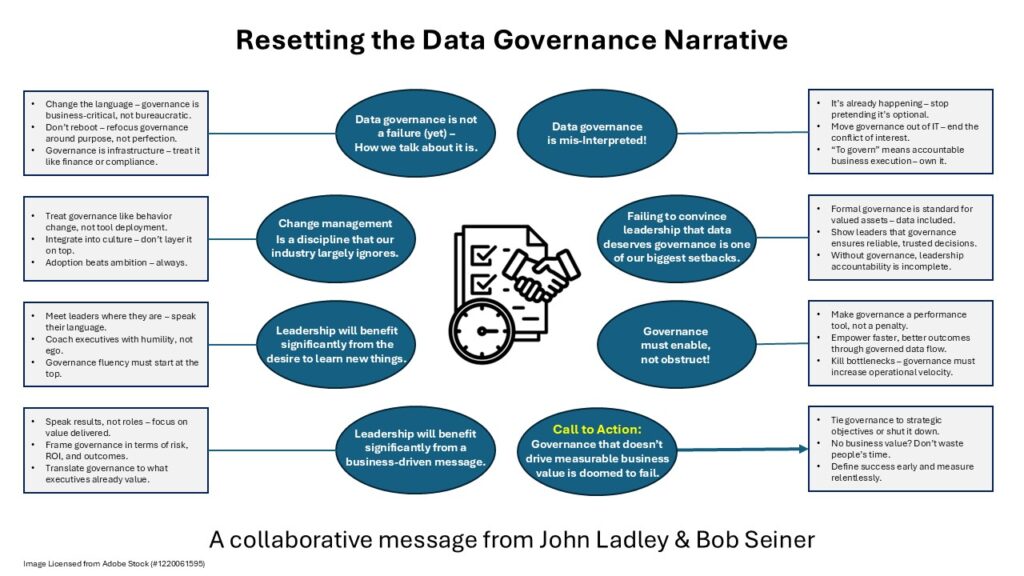A Joint Statement from John Ladley & Robert S. Seiner:
For years, we have watched data governance be misrepresented, over-complicated, and – let’s be honest – over-cooked. Organizations struggle with ineffective implementations, leadership resists investing in governance, and practitioners find themselves caught between rigid compliance mandates and the realities of how data is used. The problem isn’t data governance itself – it’s how it’s being understood, communicated and applied.
As two long-time advocates for practical, results-driven data governance, we are using our voices, experience, and influence to call for a reset. Our message is not intended to promote our practice, or further interests in a product or service. Candidly, we want the reader to start to think for themselves instead of relying on a talking head or vendor-driven scenarios.
The world has changed. AI, automation, real-time data, and transitions in the workforce are forcing organizations to rethink how they manage and use information. “Data driven” appears in annual reports. Yet, we still see governance framed as an IT function, treated like an administrative roadblock, or a set of restrictive policies rather than what it truly is – a business capability that is a catalyst for efficiency, trust, and innovation.

Lessons We Must Acknowledge to Move Forward
- Data governance is not a failure (yet) – how we talk about it is. Organizations already handle data informally. These efforts are inconsistent, inefficient, and ineffective. Never forget that governance already exists in your organization so the focus must be on practical refinement of what exists or practical iterations. “Data” governance is an expansion of a long-accepted concept.
- Data governance is mis-interpreted – Data governance is widely misunderstood – and often dismissed as stale – because people forget it’s not new. At its core, governance simply means the execution and enforcement of authority – it’s the check in the checks and balances that ensure your data works. That’s why data governance must move out of IT. Keeping it there creates a conflict of interest and undermines fundamental business principles. Governance belongs with the business, where accountability lives.
- Failing to convince leadership that data deserves governance is one of our biggest setbacks. We must normalize the idea that formal, monitored behavior around data is just standard business practice – no different than how finances or operations are governed. Governance is already in the job description of CEOs and boards of directors. Without it, an organization’s actions can’t be verified or trusted. When someone claims, “data governance slows us down,” what they’re really saying is, “we’re okay with producing unmeasurable, un-verifiable results.” That mindset is the real threat to progress.
- Governance must enable, not obstruct. Governance is often implemented in ways that slow progress rather than accelerate it. Governance must be positioned as an EFFICIENCY driver that supports and enables value from all uses of data assets. Technology can help administer and enable governance, but, like providers of other software tools, vendors want to sell their software and will assert themselves at any opportunity.
- Leadership will benefit significantly from a business-driven message. The message must be one that is shielded from technical jargon. If we continue to pitch governance in terms of data quality, metadata, lineage, and data catalogs, we will continue to lose the attention of executives. These items are part of a data professional’s job. Governance must be framed in terms of revenue growth, risk mitigation, operational efficiency, and AI and regulatory readiness.
- Leadership will benefit significantly from the desire to learn new things. There are aspects of Data Governance that echo the sounds of Total Quality Management (TQM). TQM required leadership to learn new methods of operation. Industry data people have shied away from engaging the highest level. We think that needs to change. We must engage. They must also engage.
- Change management is a discipline that our industry largely ignores. Data governance requires change. The industry needs to focus on behavior changes and embedding governance into everyday work without unnecessary disruption.
- Governance that doesn’t drive measurable business value is doomed to fail. Every governance initiative must be directly tied to outcomes like improved customer experience or reduced risk – or it won’t stick. This isn’t revolutionary; Marketing, HR, and Accounting are all enabling functions held accountable for results. Governance must be no different. Success demands alignment and intentionality, not avoidance.
Using Our Influence to Drive Change
We are done watching data governance be misunderstood and misapplied. So are many of our peers. The call to action must shift the conversation, cut through the noise, and start treating governance like the required business capability it truly is.
As recognized leaders in the industry, we are committed to using our platforms, experience, and networks to reframe how governance is discussed and implemented. Our operating models for DG must facilitate and accelerate organizations’ cultures, and readiness. Data governance must be aligned with organization strategy. AI, data-driven decision-making, and digital transformation demand governance that is practical, adaptable, and directly tied to business success.
The call to action is this. Data leaders, executives, vendors, and practitioners need to hear a new narrative. Leadership is the audience. They do not only want to hear about better reports, the need for metadata, or the wonder of a data catalog. We need to look up from our shoes, look them in the eye, communicate more effectively, and educate. This will mean repeated statements to an unwilling audience. “The world has changed. Leadership needs to monitor data assets and support better data behaviors – or you will never be fully data-driven. “
There will be many opportunities in the coming months to weigh in. It is time to stop treating governance as an afterthought, or as an obstacle, a means to make a quick sale, or even as a new, miraculous panacea – and start making it the business-critical, required capability it was always meant to be.
Signed John Ladley and Bob Seiner
April 1, 2025